Research Papers ( 73 Found )
| Date | Details | Document |
|---|---|---|
Mon, Nov 16, 2020 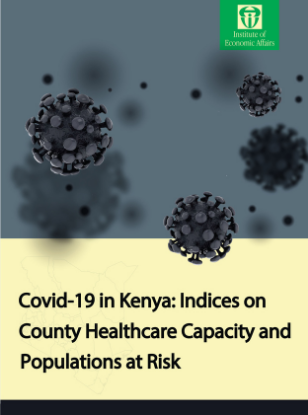 |
COVID-19 in Kenya: Indices on County Healthcare Capacity and Populations at RiskAuthor(s): IEA Kenya,Theme: Accountability, The virus, COVID-19 is burdening an already strained healthcare system in Kenya. Under the 2010 Constitution and after the 2013 election, healthcare is one of the 14 functions that has been devolved to the newly formed 47 counties. County governments are now at the frontline of delivering services to address the COVID-19 pandemic. However, healthcare capacity in the 47 counties is varied. Historical inequalities across regions, and in the health sector, date back to colonial times and despite seven years of devolution (2013-2020), convergence towards a uniform healthcare system across counties is far from a reality. This report offers some empirical evidence on which of the 47 counties in Kenya are best and least-well situated to deal with the Covid-19 virus. The purpose here is to assist policy makers in determining where limited resources, financial, human, and medical, can best be employed and where additional support may be provided by the national government to augment local resources. The report presents data on two critical dimensions of countries specific circumstances: their healthcare capacity to respond to the virus and the risk to their population of contracting the disease. The data are presented in the form of two indices, specifically a healthcare capacity index and a population risk index. As the objective is cross-county comparisons, these are both relative measures. Another measure on county population size is also provided since the absolute size of a county’s population may be a factor in how resources need to be deployed. |
File Size: 4.34 MB No of Downloads: 622. |
Thu, Oct 15, 2020 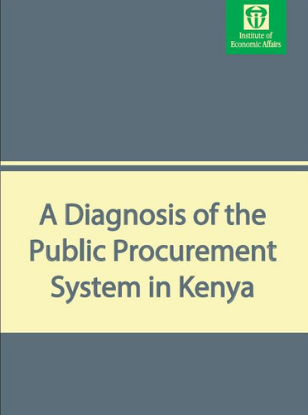 |
A Diagnosis of the Public Procurement System in KenyaAuthor(s): IEA Kenya,Theme: General, This paper traces the institutions and processes that govern the use of public resources within the public sector in order to identify whether the broad goals of the public procurement policy are being achieved. Following this detailed review and selected case studies, the study contends that while the quest to use public procurement to advance economic development is a legitimate policy goal, government procurement in Kenya unequivocally fails to do so. And this failure is regular and consistent throughout most state departments, ministries and agencies, suggesting that the incentives for a clean, transparent and effective public procurement in Kenya will remain a long-term challenge in Kenya’s development path. |
File Size: 2.88 MB No of Downloads: 783. |
Tue, Aug 11, 2020 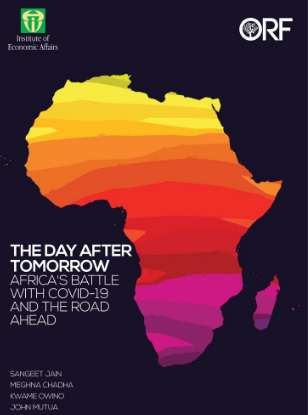 |
The Day After Tomorrow: Africa’s Battle with Covid-19 and the Road AheadAuthor(s): IEA Kenya, ORF,Theme: General, Our report in collaboration with Observer Research Foundation provides an account of Africa’s battle against COVID-19, maps a profile of the continent’s vulnerabilities that render it susceptible to systemic collapse, and analyses ways in which it can build resilience in the face of future crises. The report takes a systemic perspective, and provides analyses oriented around four axes: Health, Economic, Socio-political and Technological systems; and three key elements: Risk, Response and Resilience. |
File Size: 5.76 MB No of Downloads: 483. |
Thu, Feb 13, 2020 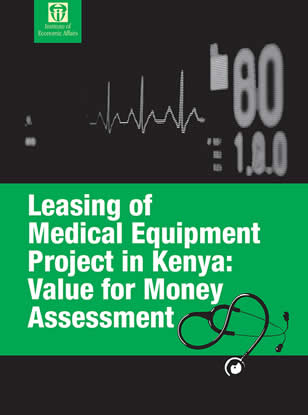 |
Leasing of Medical Equipment Project in Kenya: Value for Money AssessmentThe Kenya Government’s commitment to provision of quality and affordable health care for all Kenyans from a constitutional, policy and even global perspective is not in doubt. As a critical component of economic development, Universal Health Coverage (UHC) is identified as one of the planks of the government’s “Big Four” Agenda. Despite obvious successes in health outcomes, in part driven by Devolution, challenges especially of inadequate medical personnel, low specialized health infrastructure to deal with a rise in non- communicable diseases and cases of injuries remain. This has engendered increasing demand for health services, piling pressure on the government budget. The leasing of medical equipment (Managed Equipment Services-MES) project was initiated in 2015 as an alternative health care financing option to scale up health infrastructure for provision of specialized medical care. The question of whether this was the most cost-effective intervention, especially as a public private partnership (PPP) project, is what this publication sought to investigate. Which then begs the question: four years down the line, is the public getting value for money from implementation of the project? |
File Size: 439.97 KB No of Downloads: 1866. |
Mon, Nov 18, 2019 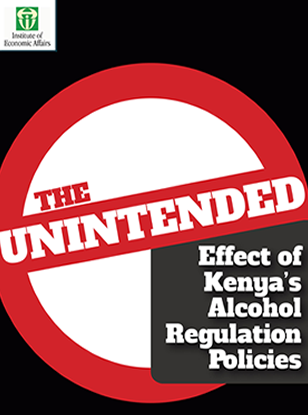 |
The Unintended Effect of Kenya’s Alcohol Regulation PoliciesAuthor(s): IEA Kenya,Theme: General, The alcohol industry is one of the top contributors of ordinary revenue to Government. The revenue generated from taxation of alcohol represents a gain to Kenya because it provides resources that may be directed for other useful purposes like public service delivery. It is also best practice that taxes collected be used in mitigation of externalities caused by excessive consumption of alcohol. Some of the mitigation efforts include public education. Alcohol contributes a significant portion of excise taxes among categories of total excisable goods. Throughout the period from 2012 to 2017, excise taxes on alcoholic beverages remained as the single largest contributor to excise taxes and accounted for between 64 and 41% of excise revenues recorded. |
File Size: 1.63 MB No of Downloads: 1235. |
Wed, Jun 26, 2019 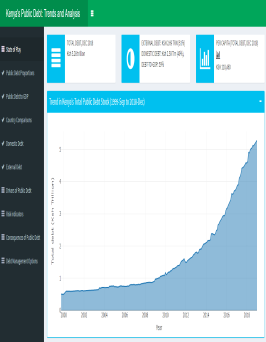 |
Kenya’s Public DebtAuthor(s): IEA Kenya,Theme: Public Finance, The study aims at providing the current state of play on Kenya’s Public Debt and the assessement of its sustainability. Debt management options, are also suggested to enhance prudence in resource utilization to achieve economic development. |
File Size: 40.00 KB No of Downloads: 11. |
Thu, Mar 21, 2019 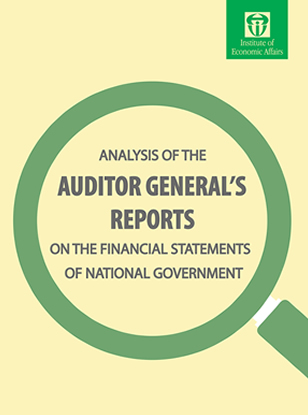 |
Analysis of the Auditor General’s Reports on the Financial Statements of National GovernmentAuthor(s): IEA Kenya,Theme: Accountability, This publication examines the findings contained in the financial audit reports published by the Office of the Auditor General for the three consecutive financial years from 2013-2014 to 2015-2016. Guided by the fact that financial audits are conducted at the sector level, the scope of this study highlights the findings for the Ministries, Departments and Agencies (MDAs) in the agriculture, health, education and devolution sectors. The findings reveal that MDAs are heterogeneous in the care and fidelity with respect to public expenditure management. Whereas public spending has grown for all four sectors, the audit opinions have varied covering the full spectrum from Clean Opinions to Adverse opinions. This confirms the claim that different departments of the government render accounts that show poor levels of accounting and expenditure management to others that adhere fully and pass the constitutional threshold of lawful and effective expenditure management. |
File Size: 1.41 MB No of Downloads: 2988. |
Thu, Jan 17, 2019 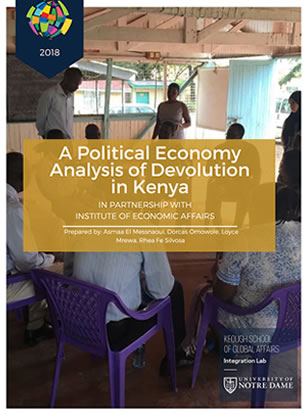 |
A Political Economy Analysis of Devolution in KenyaAuthor(s): IEA Kenya, University of Notre Dame,Theme: General, This paper explores the diverse viewpoints of stakeholders on devolution and examines the implications of these recent changes in the micro- and macro-workings of Kenya through a political economy analysis framework. In what follows, interview results, are grouped into four thematic areas:
Key recommendations include:
|
File Size: 2.65 MB No of Downloads: 6770. |
Thu, Sep 6, 2018  |
Kenya Urban Areas Performance Index Report 2017Author(s): John Mutua, Noah Wamalwa,Theme: General, This report shows performance of the six largest urban areas in Kenya based on three areas, namely: service delivery, conditions for investment and governance. Performance of these urban areas is assessed using the Urban Areas Performance Index, a composite Index comprising 67 indicators (questions) that scores, on a scale of 0 (least performance) to 100 (best performance) points and ranks these urban areas. Urban areas that ensure individuals’ free choice, create favourable business conditions, use public resources efficiently and ensure transparency of their activities are ranked higher. Also, the report provides a rich source of data and information that can be used by different audiences including policy makers, civil society, researchers, students, the media and indeed the general public to inform debate and dialogue on urban governance and planning. For example, this report provides policy makers with impetus to initiate the process of establishing urban areas structures. Similarly, it provides key messages for other groups such as the media and civil society to advocate for the same. |
File Size: 974.21 KB No of Downloads: 2772. |
